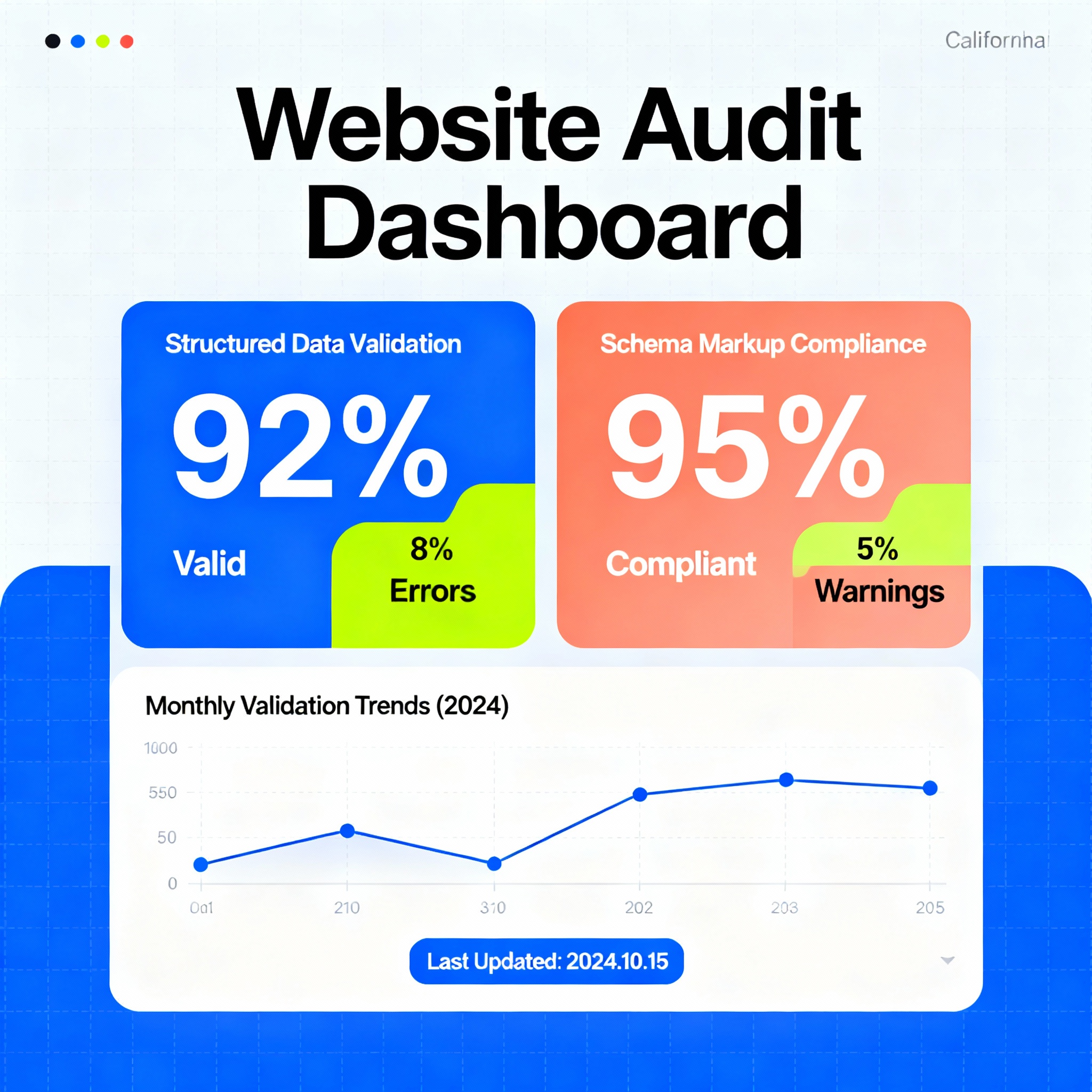Structured Data and Schema Markup Validation: The Foundation of Technical SEO in California
Website Audit & Technical SEO: Structured Data and Schema Markup
In California’s competitive digital landscape, every business striving for visibility must embrace technical SEO to maintain a strong online presence. Among the most crucial yet overlooked aspects of technical optimization are structured data and schema markup validation. These elements fuel rich search results, clarify your content to search engines, and strengthen overall site authority — all essential components of a comprehensive website audit for any California-based business.
Understanding Structured Data
Structured data is a method of organizing and labeling website content so that search engines like Google can interpret it more accurately. Instead of guessing what your page is about, structured data explicitly states whether your content represents a product, article, local business, or event. It uses the schema vocabulary standardized at Schema.org, which supports JSON-LD, RDFa, and Microdata formats. JSON-LD has become the preferred choice due to its simplicity and cleaner integration within page code.
For example, when adding structured data to a local business in California — let’s say a digital agency in Los Angeles — you can define:
-
The business name and description
-
Address and geo-coordinates
-
Operating hours and contact details
-
Service type and service area
Once implemented, this structured data improves how your business appears in Google Search and Maps, crucial for regionally targeted visibility.
 Schema Markup and Its Technical SEO Importance
Schema Markup and Its Technical SEO Importance
Schema markup is the language that expresses structured data and helps search engines display rich results — search listings enhanced with ratings, images, or FAQs. In 2025, schema markup has evolved into a vital technical SEO strategy because it provides both context and credibility to web content.
When performing a website audit in California, checking your schema implementations should be a top priority. A well-structured schema boosts your organic click-through rate and improves your online reputation. This process aligns perfectly with the technical SEO principles that govern modern site performance metrics like structured crawl efficiency and E-E-A-T (Experience, Expertise, Authoritativeness, and Trustworthiness).
Validating Schema Markup: The Do’s and Don’ts
Validation ensures that your schema markup is correctly implemented and properly understood by search engines. The process typically involves:
-
Using the Schema Markup Validator: This official tool checks your code for syntax or semantic errors and ensures alignment with Schema.org standards.
-
Running Google’s Rich Results Test: This confirms whether your structured data can generate rich results. It’s a vital part of the validation process.
-
Monitoring through Search Console: Google Search Console displays errors and warnings related to structured data, allowing California businesses to fix issues before they affect rankings.
-
Regular Updates: Schema should evolve with your content; outdated markup can confuse crawlers and damage ranking trust signals.
Skipping these validation steps can cause search engines to misinterpret your intent, or worse, ignore the markup entirely — wasting your optimization efforts.
Structured Data and Website Audit Integration
In the broader context of technical SEO and website audit, structured data validation plays a key role in site health diagnostics. A comprehensive technical SEO audit involves analyzing crawlability, duplicate content, page speed, and structured data implementation quality.
Here are key integrations within a website audit focused on structured data:
-
Schema Detection: Identify which pages already include structured data and whether it matches content type.
-
Code Accuracy: Audit JSON-LD or Microdata formatting for consistency.
-
Data Completeness: Ensure schema fields like name, description, and URL are properly populated.
-
Cross-Tool Monitoring: Link Google’s Structured Data tools with third-party analyzers like SEMrush or Sitebulb for deeper validation layers.
 When your seamlessly integrates with other technical SEO components, it forms a fully optimized web ecosystem. This ensures Google interprets your website the same way you intend your audience to.
When your seamlessly integrates with other technical SEO components, it forms a fully optimized web ecosystem. This ensures Google interprets your website the same way you intend your audience to.
California’s Local SEO Advantage Through Schema
For California businesses, schema markup offers a specific advantage: geo-targeted SEO visibility. LocalBusiness schema, combined with rich geographic attributes like service area and region, can significantly enhance maps integration and featured snippets. AI-driven search in 2025 increasingly relies on structured context to match local queries with high relevance.
Adding schema types such as “Organization,” “Product,” or “Event” further helps businesses tap into niche search results, like California tech events or local digital agencies optimized for “SEO in San Francisco.” Not only does this build visibility, but it also attracts intent-driven clicks that convert more effectively.
Common Errors to Avoid During Validation
In California’s fast-paced SEO market, small technical mistakes can result in big ranking losses. During validation, businesses often encounter these common issues:
-
Improper Nesting of Entities: Forgetting to close schema objects or misusing nested structures within JSON-LD.
-
Non-Matching Content and Markup: Markup must reflect the visible content on the page, as per Google’s validation policies.
-
Ignoring Warnings in Rich Results Test: Even non-critical warnings can prevent visibility in rich snippets.
-
Duplicate Schema on Similar Pages: Avoid schema redundancy across identical or duplicate content URLs.
Conducting a regular technical SEO audit prevents these issues before they escalate, maintaining performance consistency.
The Role of Structured Data in Technical SEO 2025
In 2025, schema markup isn’t just an enhancement — it’s a necessity for maintaining robust search visibility. With AI-powered search and contextual ranking models dominating Google results, schema acts as a translator between human content and machine understanding.
Properly validated schema markup strengthens:
-
Knowledge Graph Integration: Improves visibility in entity-based panels.
-
Voice Search Optimization: Boosts contextual relevance for conversational queries.
-
Content Discoverability: Facilitates quick indexing by clarifying page purpose.
Technical SEO in 2025 continues to evolve around user-first indexing principles, and structured data validation remains a cornerstone that ensures your content aligns with Google’s modern search expectations.
The Connection Between Website Audit and Rich Results
A website audit focuses not just on crawl errors or site speed but also on semantic clarity. Search results enriched with schema markup produce better engagement metrics — higher click-throughs, lower bounce rates, and improved dwell time.
For instance, a California digital agency’s service page with “Organization” schema might include details like service category, founder, and rating. Google’s algorithm interprets this as a trustworthy, authoritative result, ranking it higher among local competitors.
The same principles apply across industries — from hospitality and e-commerce to healthcare — where schema clarity equals better discoverability and conversion potential.
Tools and Techniques for California-Based SEO Experts
California’s SEO ecosystem thrives on precision and performance. To manage schema markup validation effectively:
-
Use JSON-LD generators from Schema.org or Rank Math for precise markup generation.
-
Conduct regular audits through Screaming Frog, Sitebulb, and Google Rich Results Test.
-
Integrate Google Search Console tracking to monitor updates in structured data reports.
-
Apply AI-driven auditing tools like PageOptimizer Pro or DeepCrawl for predictive schema corrections.
With these tools in place, California-based digital agencies can maintain technical SEO accuracy across client sites and guarantee improved search representation.
 Trending FAQs
Trending FAQs
1. Why is structured data vital for technical SEO in 2025?
Structured data simplifies how search engines interpret your content, enhancing visibility through rich results while improving technical SEO integrity.
2. Which schema format works best for California websites?
JSON-LD is the most recommended schema format due to its flexibility, cleaner syntax, and alignment with Google’s Core Web Vitals.
3. How often should I validate my schema markup?
Schema validation should be done after every major website update or quarterly as part of a website audit to adapt to Google algorithm changes.
4. Can schema markup improve local rankings in California?
Yes, LocalBusiness and Geo schema types can significantly boost visibility in regional searches and map-based results, improving foot traffic and online conversions.
Key Takeaway
Technical SEO success in California hinges on perfect alignment between human content and machine comprehension, and structured data is the bridge that makes this possible. A regular website audit ensures that schema markup is validated, updated, and aligned with the latest Google Search patterns — establishing trust, improving visibility, and ultimately driving measurable organic growth.
For businesses seeking professional assistance with structured data, schema validation, and in-depth audits, Tech Media Square offers specialized website audit services tailored for California enterprises. Visit Tech Media Square – Website Audit Services to explore how expert-guided audits and validation can elevate your technical SEO performance.



